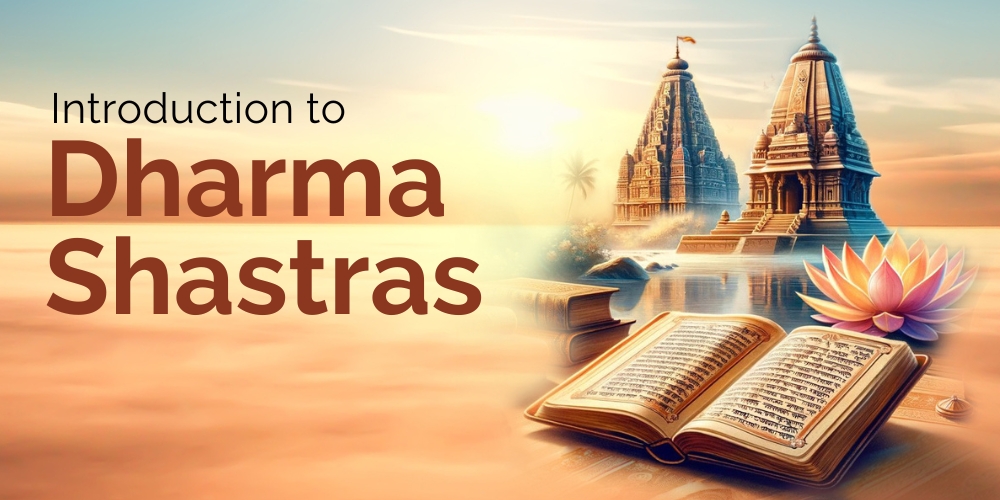
Introduction to Dharmashastras
Dive into the heart of our cultural and philosophical heritage with this comprehensive online course that offers a unique opportunity to explore the ancient texts that have shaped the moral and ethical framework of Indian society for centuries. Whether you’re a student of philosophy, a practitioner seeking deeper understanding, or simply curious about the rich tapestry of India’s spiritual heritage, this course is for you. With a blend of live sessions, class recordings, and a comprehensive reading list, you’re set to embark on a journey of discovery and enlightenment.
Faculty
31 January 2024 - 30 October 2024
6:00 PM IST-7:30 PM IST
Every Wednesday
Introduction
Dharmaśāstra texts occupy a prominent place in Indian textual tradition as authentic sources of dharma. Despite this, the contemporary engagement with the text has been prejudicial and problematic and most importantly, one of discomfort.
The contemporary Hindu society’s discomfort with Dharmaśāstra tradition in general and with texts such as Manusmṛti in particular owes much to the effects of colonialism and the destruction of indigenous education institutions, as a result of which the society has become deracinated having lost touch with this core aspect of our culture. In particular, people find it exceptionally difficult to relate to the teachings of the Smṛti texts owing to unfamiliarity with the purpose, textual landscape, and the underlying worldview of Dharmaśāstras. Furthermore, the Dharmaśāstra texts employ a unique language to convey its teachings about dharma which poses significant challenges to understand and appreciate it owing to presentism.
Course Objectives
This course seeks to fill the gap in contemporary approach and facilitate a better understanding and appreciation of Dharmaśāstras and their relevance to contemporary world by highlighting certain important aspects of their textual landscape and the worldview that informs them.
Course Outcomes
- General understanding of the landscape and subject-matter of Dharmashastras.
- Good grasp of fundamental tenets of Dharma and the interpretive principles that govern Dharmshastra texts.
- Overall a better appreciation of Dharmashastra tradition and its relevance in contemporary world.
Course Syllabus
- Anubandha Chatushtaya
- The object, purpose, and competent student in the context of the study of Dharmashastra
- Origination, Transmission, Textual Landscape of Dharma tradition
- Origination of Dharma Teaching in Bhagavan Brahmaa
- Different lines of transmission of Dharma
- Textual Landscape
- Key pointers for Studying and Interpreting Dharmashastras
- Hermeneutics of Shraddha
- Karma Siddhanta: The Law of Action and its Fruits
- Locating Dharma: cosmologically, temporally, teleologically, functionally, and relationally
- Subject Matter of Dharmashastra Tradition
- Tenets of Dharma
- Samanya Dharma
- Varna Ashrama Dharma
- Stree Dharma & Purusha Dharma
- Raja Dharma
- Dharma as Foundation for Moksha
- Samanya Dharma as means for Chitta Shuddhi
- Varna-ashrama Dharma as Yajna, Karmayoga and Bhaktiyoga
Reading List
- Sridhar, Nithin (2019). Samanya Dharma: Ethical Duties Common to All. Subbu Publication. https://www.amazon.in/SAMANYA-DHARMA-NITHIN-SRIDHAR/dp/8194282608
- Sridhar, Nithin (2021). Isopanisad: An English Commentary. Subbu Publication. https://www.amazon.in/Isopanisad-Nitin-Sridhar/dp/8194868831/
- Sridhar, Nithin. Chatuh Sloki Manusmriti: An English Commentary. Vitasta Publication. [Upcoming Publication]
Course includes
- Live sessions
- Access to class recordings for asynchronous participation
- Certificate of Completion upon successful course completion

